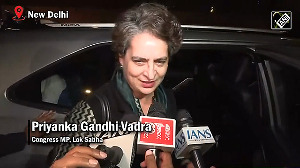You're a free spirit and hate the thought of working in a boring nine-to-five job, harassed by cantankerous bosses, intimidated by office politics and doing things you don't want to. You've chosen the option of striking out on your own.
 While working on your own is certainly an attractive proposition, there are some downsides as well.
While working on your own is certainly an attractive proposition, there are some downsides as well.
One, obviously, is the uncertainty. Unlike a regular job, if someone doesn't like your work, it's goodbye to that client's cheque. Today you may be in clover; tomorrow, you could end up scrounging for that loose change in the bottom of your drawer.
Two, no perks -- no paid leave, medical allowance, office mediclaim or House Rent Allowance.
Three, no forced savings, which means no compulsory Provident Fund deductions from your salary. It's all up to you to put something away for your old age.
Four, if you fall sick and can't work, there goes your income.
So, if you haven't already logged in to Naukri.com and put in your application for a stable job, here are a few tips to handle your finances. The important thing to remember while living on an unstable income is that it requires a higher degree of planning and meticulousness.
Budget! Budget! Budget!
The first thing you should do when you're living on an unstable income is make a budget -- and stick to it. Prioritise your expenses.
For instance, you need to spend a certain amount on things that are absolutely essential, like food, electricity and phone bills. And then, there are the non-essential items like new clothes, entertainment, gadgets, holidays and gifts. Separating the essentials from the non-essentials will help you cope better when things aren't going so good.
Says Anil Mani, a professional voice-over artist and compere, who has been freelancing for a little over 10 years: "Wants should be prioritised and extra costs trimmed. Certain payments can be delayed if there's a shortage of cash. For example, housing society bills can be delayed a bit, but not electricity bills. Also, one can do without a television, a mobile phone, etc."
Having a budget introduces an element of discipline in your spending and forces you to save more. Which means you can even out differences in monthly incomes to maintain a regular lifestyle, instead of splurging on pizzas one month and eating peanuts the next.
Typically, people with unstable incomes will need to keep a higher percentage of their income liquid. The percentage will vary from person to person, depending on their cash flow and expenses. Financial planner Devang Shah, Right Returns Financial Planning, says, "The instability of income is with reference to a period of time. You have to stretch the time horizon according to the cash flow. For instance, if you earn Rs 1 lakh a quarter, which means an annual income of Rs 3 lakh, you should keep around Rs 75,000 liquid," he says. A higher liquidity (easily available cash) also buffers you against contingencies. Otherwise, you may have to dip into your long-term savings or borrow.
"Unforeseen expenses may arise -- like good bargains, weddings, illnesses, etc. One should have a buffer amount to meet these," says Mani. "Decide on an amount to be kept in your savings account and leave it intact. Ideally, you should keep two months' earnings in your savings account," he adds.
Why you have to save more
Since, freelancers do not have the advantage of forced savings such as Provident Funds or access to low-interest office loans in times of crisis, they have a greater need to save for their nest egg and to tide over bad times.
Preeti Kopikar, for instance, saves half of whatever she earns. "Come what may, I never touch this amount. This has made me more disciplined, enabling me to save quite a bit over 10 years," she says.
Splurging once in a while is okay, but any surplus cash should be treated as a bonus and should be put in long-term investments. "Since I don't buy on impulse, I can save smartly," says Kopikar.
Shah feels it's a good idea to have two accounts: Use one to deposit your earnings, and the other to settle expenses. That way you will know exactly when you are exceeding your expense limits. "Also, when you have a fluctuating income, try to make all payments in cash or cheque and refrain from using credit cards," he adds. If you default on your credit card payments, you will end up paying extremely high interest on your outstanding.
Risk vs return
Where should freelancers invest their savings for greater returns? There's no one-size-fits-all strategy. Mani suggests gold and fixed deposits as good low-risk options, and recommends bonds and stocks for those with a bigger appetite for risk. He also says it's unwise to put all eggs in one basket.
Spread your investments across a variety of options to reduce risk, he says.
Kopikar is a strong advocate of mutual funds; she used to invest 5% of her income in mutual funds earlier, and has now increased it to 20%. She recommends Systematic Investment Plans, where you invest a fixed amount each month. What this means is that you get more mutual fund units when stock prices are low, and less when prices are high, for the same amount.
Insurance is another aspect freelancers should consider seriously. Make sure you get insurance for everything -- your home, health, property, your life. Not only does this give you a high sense of security, it also makes it easier for you to avail of housing loans.
Home sweet home
The biggest investment most people make in their lives is on a home of their own. And the only way they can by a home is by taking a home loan. This poses a major problem for freelancers, because most banks don't readily provide loans to people with uncertain incomes.
Banks may give you a loan if your income has been reasonably steady over a few years, but the onus of proving your creditworthiness is entirely on you. So make sure you keep all those bank accounts and other documents in order.
And even more important, file income-tax returns regularly. Banks insist on scrutinising your returns before they sanction a loan, especially if you are self-employed. "I took care to see that my bank records and my accounts were in order. I also had a very strong guarantor when I went for my housing loan, and, naturally, I consulted a financial expert for my taxes," says Kopikar.
Besides spreading your investment risks, you also need to spread your income risks as well. One big client may be easier to manage than a host of smaller ones, but the risks are equally high -- if you lose that big client, you end up with nothing. Kopikar, for example, has spread her risks by getting into production as well.
Working on your own can be a rewarding experience in more ways than one; all it needs is some efficient management.
Sepia Media Consultants





